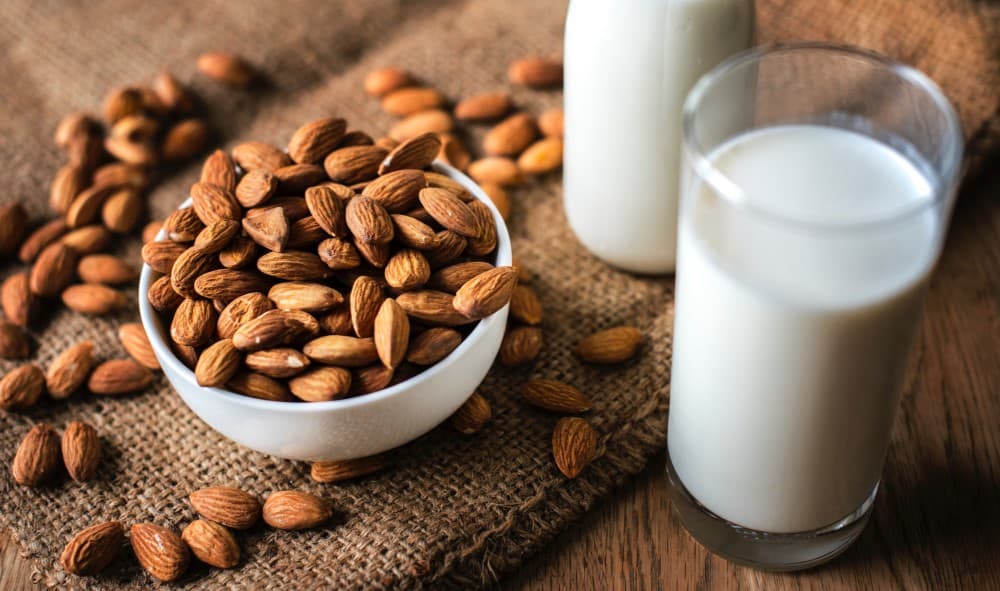Taking casein before going to sleep (or any other protein) is a popular strategy for optimizing muscle building for bodybuilders, athletes and fitness enthusiasts, as long as I can remember.
But should you take Casein before bed?

In this article, I will examine what the scientific literature says about it and whether it lives up to its reputation.
Reasons for Casein before Bed
Casein is a protein found in milk. Cow’s milk accounts for about 80% of the protein content (the other 20% are whey protein, commonly known as “whey”). Casein is digested slower than Whey – with an estimated absorption rate of 6.1 (casein) and 8-10 (whey) grams per hour.
The slower digestive rate of casein is primarily due to the structure, as coagulation in the stomach reduces the rate of gastric emptying. This slow digestion of casein results in a longer-term increase in the blood’s amino acid concentration and a greater blockade of protein degradation, with less increase in protein synthesis compared to Whey’s faster digestion, which is why it is often referred to as “slow-protein”
The underlying premise behind taking casein at bedtime is the positiv.e effects on muscle protein synthesis (MPS) and muscle protein breakdown (MPB), which reinforces the physical response of the workout and at the same time stops muscle breakdown that hits your hard developed muscles while you sleep.
Facts about Casein before Bed
When you look at the dietary protein and the timing of ingestion, it is important to see things from the right perspective.
Example: If the daily protein intake is too low, the other factors become more important and vice versa. This idea is supported by recent reviews and a meta-analysis by Aragon and colleagues, who describe that any benefits in terms of timing protein intake are most likely due to an increase in total protein levels (ie Protein before and after training leads to a mismatch of the total intake of the groups).
If someone spends a lot of protein throughout the day (ie distributes the protein evenly), it is difficult to determine to what extent the increase in protein quality (in this context, the number of essential amino acids and chained amino acids – especially leucine – of the protein source ) or taking the shake immediately after exercise or before going to bed makes a big difference in terms of exercise adaptation, muscular hypertrophy or retention.
However, in this example, with uniform distribution, the availability of protein (> 2 g / kg), although of low quality, would still result in a maximal anabolic response, although not as efficient as other high-quality protein sources (on one gram basis). One possible exception would be for vegans who do not have enough essential amino acids in their diet.
Unfortunately, we do not have enough data to fully answer the question in this article, so let’s look at a theoretical example of a single (80kg heavy man with about 10% body fat percentage) with good nutrition. Based on this, we can then see if supplemental administration of casein at bedtime promotes hypertrophy or muscle maintenance.
Muscle Hypertrophy
For this example, I assume the daily protein intake of 2.5g / kg, mainly from animal sources (meat, poultry, eggs, milk). For someone with a neutral or positive energy balance, this type of intake is more than sufficient to build muscle.
The outcomes were as follow:
With 2.5g / kg protein and the goal to build muscle, the protein intake is already very high, so it seems unlikely that the addition of casein further increases the growth.
Moving a protein meal to the time just before going to bed in the form of casein protein will most likely yield no better results than the protein that was taken before (<3 hours before bedtime).

Muscle Maintenance
Regarding maintaining muscle mass, I would leave the protein sources the same and increase the daily intake to 3g / kg. The rationale for higher intake during a diet is that muscle protein is preserved.
As explained in the summary above, the protein distribution (throughout the day) seems less important for maintaining muscle mass – compared to the build up. Although some questionable inferences have been considered, the ISSN’s view on meal frequency shows that a reduced meal frequency on lean body mass under hypocaloric conditions has no negative effect on ingesting enough protein.
Therefore, it seems that it makes little difference when it comes to maintaining muscle mass during the diet (assuming that enough protein is consumed if you eat 10 or 2 times a day.) For this reason, I would still tend towards our example athlete takes the same distribution to get the base and that he does not change much between his goals (muscle building or fat loss).
Looking at these factors, I see no reason to take casein before going to bed to improve muscle maintenance while in an energy deficit.
Therefore, there are no definitive conclusions to be drawn before external and valid studies that address the exact question of this article cease. Thus, if protein intake is already optimized and casein makes sense at bedtime, it is not the only slowly digestible source of protein.
For example, boiled eggs, pea protein, milk, and soy protein isolates have an estimated digestion rate of 2.9, 3.5, 3.5, and 3.9 g / h, compared to 6.1 g / h for casein protein.
Conclusion: Casein before Bed
As casein is slowly digested, taking it at bedtime has become a popular strategy for athletes seeking to minimize muscle loss and maximize muscle gain.
Both short- and long-term studies, which have examined the efficiency of this practice, show their limitations. For this reason, no definitive answer regarding the timing of the casein intake can be given. Nevertheless, taking casein seems to be a good strategy to maximize protein if the (absolute daily) dose is otherwise too low.
Since there is not enough data and we look at the matter from the theoretical side, it seems unlikely that taking casein at bedtime will benefit anyone who already consumes enough high-quality protein throughout the day. Which is the case for most serious athletes.
Therefore, my recommendations for individuals who want to optimize or adapt their muscle build-up (or gain muscle mass) are as follows:
Take enough high-quality protein and balance the amount with your goal.
Distribute about 4-6 meals every 3-4 hours if you want to play it safe.
If these factors are correct, experiment with protein intake at bedtime. If you do not see any benefit in it, let it stay and focus on paying attention to the points that are important.
Cheers,
Sam




